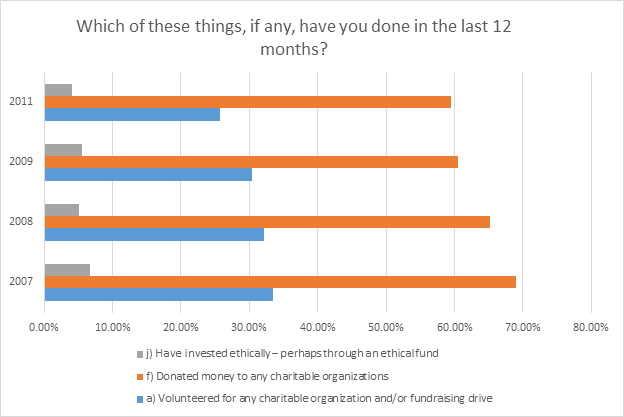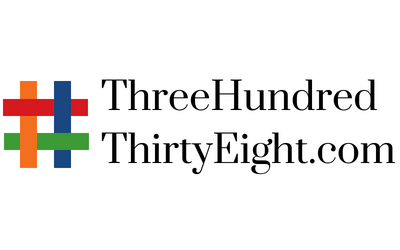By Jennifer Peers
Ethical investing has been around for over a century, dating back to 18th century Quakers (Rayer, 2017). However, the demand for stocks that reflect the values of investors has become more prominent with issues such as global warming becoming more exacerbated over time. Accompanying the growing demand for ethical investments are a whole slew of new terms for it, including; socially responsible investing, impact investing, environment, social and governance investing, sustainable investing and green investing among others.
We collected survey questions from 1994 to 2019 to see how Canadian’s feel about ethical investing. We identified fifty survey questions related to ethical investing. The survey questions and corresponding data have been shared on OpenICPSR for those interested in the data.
Several interesting observations emerged from the data collected. In particular, a data set from 2007 to 2011 appears to show a decline amongst Canadians over the years, in volunteering, donating, and ethical investing

One reason for this decline could be the 2008 recession which financially devastated the global economy and many consumers along with it. During times of financial hardship, charitable giving typically declines. As one Stanford University article put it, “in 2009 the economic downturn of 2008 has given rise to one of the largest year-over-year declines in charitable giving since the late 1960s” (Reich & Wimer, 2012).
The collected data for these years also demonstrates that behaviors such as donating to charitable causes, boycotting a company on ethical grounds, and buying a product or service because of an established link to a charitable organization are more prevalent in Canada than ethical investing. This suggests that this practice is still relatively unfamiliar to Canadian consumers despite it being around for some time. Correspondingly, one survey found between 2017-2019 that most Canadians have heard about responsible investing but know little or nothing about it.
Question: To what extent are you knowledgeable about responsible investments that consider ESG factors?
| Year | I have heard about responsible investing but know little or nothing about it |
| 2017 | 54% |
| 2018 | 46% |
| 2019 | 49% |
While knowledge on ethical investing may be limited for many Canadians, their desire for more ethical investing opportunities is clear from the data. A recent Ipsos poll found that 63% of Canadian investors are interested in starting or building their portfolio of ethical investments. This increasing demand for investments that align with investors values will require more resources and supports from Canada’s banks and investment companies.
